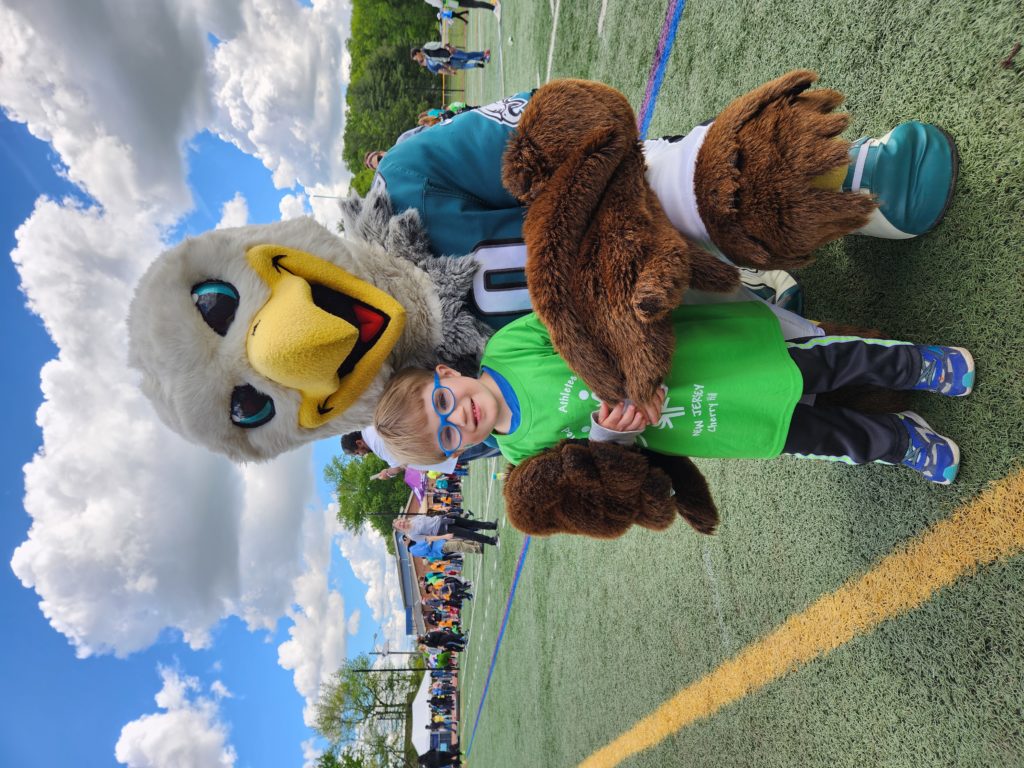
For seven years, Cherry Hill resident Jessica Simkins has been researching and actively learning about Myhre Syndrome, a condition caused by a genetic mutation that her 7-year-old son Clark Stahl was born with.
As a result, she and several others organized the Myhre Syndrome Foundation’s first in-person international conference on the condition late July in Philadelphia. She and Clark were excited to attend.
Simkins recalled how when Clark was still in utero, her care team noticed some abnormalities and were concerned with his heart. She got a second opinion at the Children’s Hospital of Philadelphia (CHOP), and they offered to allow her to give birth in the special delivery unit because they thought Clark would need immediate heart surgery.
“You have to have an exceptionally healthy mother and a very unhealthy – or at least they think – a severely unhealthy child,” Simkins explained. “So I had to go through a lot of testing to prove that I was healthy enough to give birth there, because they only had the tools to support a child. They don’t have the tools to support an adult.”
Within his first few minutes of life, Clark did crash, and he spent his first three months of his life at CHOP, where there a number of tests were done. One year later, when following up with a geneticist, Simkins recalled the stroke of luck that happened when the head geneticist took one look at Clark and thought he had Myhre Syndrome.
“That was amazing, because in 2018, people didn’t have that awareness of what features are common with Myhre,” she emphasized, “but she had actually seen another patient with it previously.”
At the time, Simkins remembered, there were only about three medical journal articles on the syndrome. The diagnosis was confirmed after doctors did a full exome sequence, because Myhre’s Syndrome is caused by a genetic mutation in the SMADA4 gene.
Unlike Down syndrome, where there is an extra gene, Simkins described Myhre as like having all of the pages of a book there, with one page out of order.
“The SMAD4 gene itself has a slight change in it,” she pointed out, “and depending on where within that SMAD4 gene the change is, there’s a couple different variants.”
Simkins also noted that the syndrome is a mutation that occurs after the egg and sperm meet and has nothing to do with any action by parents. The odds of having another child with Myhre Syndrome would be “extremely rare,” she added, though if an individual who has the syndrome has a child, there is a strong possibility of passing it on.
According to the Myhre Syndrome Foundation, common traits of people with the condition include “short stature, characteristic facial features, intellectual disability and or autism, limited joint mobility, problems with lungs and airways, issues with heart and blood vessels, thickened skin and hearing loss.”
“It causes the gene to overperform than underperform, which can cause fibrosis,” Simkins added, “which is the tendency to build scar tissue and to have thicker tissue throughout the body, and it’s all encompassing.”
For instance, Myhre can make it harder for one’s chest cavity to expand and contract to get a full breath of air, or make it harder for the heart to squeeze and pump blood through the body the way it should.
“It’s a progressive disorder,” Simpkins pointed out, “so all of these traits get worse over time, which is why some of the people in the Myhre’s community don’t live until the age that a typical person does.”
After Clark had been diagnosed, Simkins joined a private Facebook group for people and families and found out about the foundation. A Move for Myhre fundraiser and bake sale were held, and this year, the foundation had its first international conference on July 27 and 28 in Philadelphia.
The conference featured medical experts who have worked with Myhre Syndrome, a medical trust lawyer with expertise on how to prepare an afflicted child for adulthood and ways to make sure everyone is taken care of – including parents.
“Because we’re spread all over the world, it’s been easier for people for cost and time to do virtual conferences in the past,” Simkins said. “But there’s such a strong desire for these families and these people with Myhre to actually meet face to face.
“It’s a very meaningful experience, and the opportunity to do it, it’s really exciting for the whole Myhre community.”
To learn more about the Myhre Syndrome Foundation, visit myhresyndrome.org.









